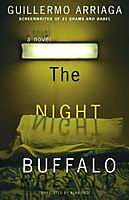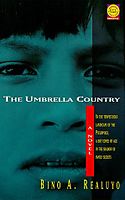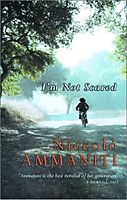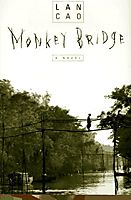Synopsis from Amazon.co.uk:
 Gregorio and Manuel were best friends. They both had a tattoo of a night buffalo, which Gregorio insisted was done with the same needle, so their blood would mingle. Since Manuel started sleeping with Gregorio’s girlfriend, the friendship had become increasingly difficult to live with. In the aftermath of Gregorio’s suicide Manuel struggles to get his life back on track. Everyone seems to suspect him of knowing more than he lets on and everyone seems to be keeping their own secrets, including his girlfriend. Most disturbingly Gregorio appears to still be watching him, letters from him appear through the post, containing enigmatic messages, ‘You won’t be able to run from the night buffalo’, they promise. Gregorio hadn’t finished dying yet. From the acclaimed writer of “Amores Perros” and “21 Grams”, this is the story of a passionate and destructive menage a trois and the tricks your mind can play on you.
Gregorio and Manuel were best friends. They both had a tattoo of a night buffalo, which Gregorio insisted was done with the same needle, so their blood would mingle. Since Manuel started sleeping with Gregorio’s girlfriend, the friendship had become increasingly difficult to live with. In the aftermath of Gregorio’s suicide Manuel struggles to get his life back on track. Everyone seems to suspect him of knowing more than he lets on and everyone seems to be keeping their own secrets, including his girlfriend. Most disturbingly Gregorio appears to still be watching him, letters from him appear through the post, containing enigmatic messages, ‘You won’t be able to run from the night buffalo’, they promise. Gregorio hadn’t finished dying yet. From the acclaimed writer of “Amores Perros” and “21 Grams”, this is the story of a passionate and destructive menage a trois and the tricks your mind can play on you.
Guillermo Arriaga is better known as a screenwriter, having collaborated with Alejandro Gonzalez Inarritu in the films Amores Perros, 21 Grams, and, most recently, Babel. Those films are noted for their nonlinear narrative, resonant characters, and a lonely, desperate sensuality. Mr. arriaga brings this same distinctive touch to The Night Buffalo, his third novel.
Gregorio’s suicide is the catalyst of the story. Most shaken by this event are Manuel, Gregorio’s erstwhile best friend, and Tania, Gregorio’s ex- (and Manuel’s current) girlfriend. Manuel feels a sense of relief when Gregorio kills himself; the strain of Gregorio’s increasingly volatile behavior was beginning to wear on him and on his relationship with Tania, which was not exactly a stable one to begin with, as the two began their affair while Gregorio was going in and out of mental hospitals. However, Manuel’s expected respite does not occur as he planned; Gregorio has left him a box filled with notes and photos. These cryptic clues reveal more betrayals and more infidelity, and Manuel realizes that he still has not disentangled himself from Gregorio’s lies and manipulation. He seeks comfort from Tania, but Tania is wrestling with her own guilt and, naturally, questions her role in Gregorio’s illness and subsequent suicide. as Tania begins to pull away from him, Manuel begins his own exploration of betrayal and jealousy, culminating in a ghastly act of violence and the dissolution of their relationship.





